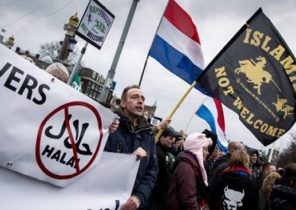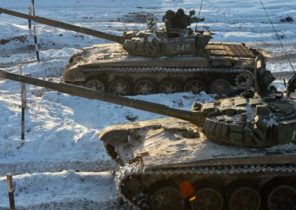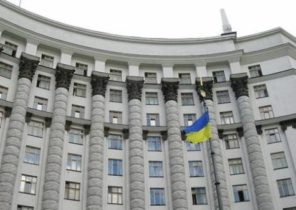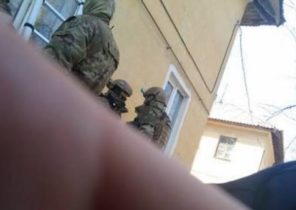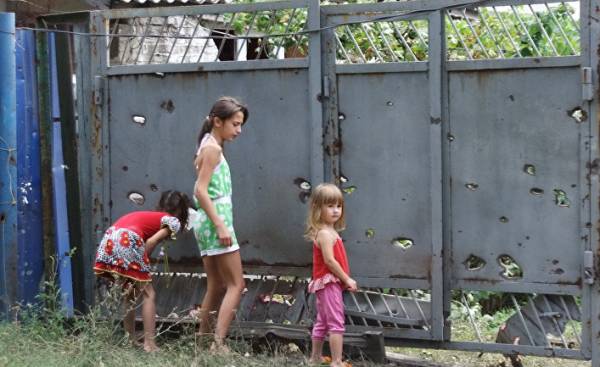
Two months before the start of the war Olga Miroshnichenko moved into a house given to her as a wedding gift. Very close fighting, and in the fence of the traces by a grenade. Life in the native settlement, however, continues.
Though spring is a long time to come, the sun is shining, blooming apricot trees, the only seller of a single shop on the street Slavic Elena Strizhak wearing a hat and blown boots.
“The pipes froze last winter,” says Shults.
She regularly goes to get warm and smoke. In such a quiet Saturday it can most of their working time to stand at the door and observe what is happening on the Slavic street.
Slavyanskaya street in the village of Novgorod, with a length of about three and a half miles, beginning at the center and ends where fighting is going on.
Located at the end of the street field is considered a line of contact in Eastern Ukraine. This is the official name of the line on one side of which there are Ukrainian troops, and on the other the rebels, supported by Russia, in particular, and in matters of armament. In this war, which began here in the spring of 2014, killing at least 10 thousand people. And these deaths are seen.
In practice, this contact line is more like a border, but are on the other side of the so-called people’s Republic officially are occupied Ukrainian territories.
On the other side of the line already use the Russian ruble, live Moscow time and study in Russian textbooks. In addition, Russia believes that local valid documents while crossing the border. This spring ceased trading relation across the front line, as the way to transport coal and coke were closed.
Little shop Strizhak — the last shop before the territory where military operations are conducted. To the contact line is a few hundred meters. However, the war often comes in Slavic the street, she comes to the store.
However, this is no surprise. Usually the war is approaching slowly and inexorably, like a storm front.
Shooting usually starts 20 kilometers, in Avdeevka, which is now the main target of the war in the East of Ukraine. From her the line of contact gradually turns to the North, crashing and explosions are heard very close to the Slavic residents of the street.
“Sometimes it may happen like this”, — says Sergey Belonozhko in the yard in front of the store.
It shows cracks in the façade of a building left after the explosion. On the second floor broken window glass, and he decided to tighten it with a transparent film. Once the projectile hit the crown of the tree in the yard.
“Ceasefire is a lot of talk, but we did not notice anything. If they announced any special ceasefire, it is still fought at night.”
Next to Belonogko lives Olga Miroshnichenko, who moved along with her husband Alexei in the Slavic street, then Stakhanov (to the Council) in early 2014. Young people at the time had just married and received this house as a wedding gift.
This is a typical street of brick house consisting of three rooms. The site is surrounded by a high fence, the yard — dog, which seems to be very angry. This is a typical quiet street in the East of Ukraine, whose name is not know, even Google maps.
The war began two months later, after moving pairs. Now the red fence covered with holes from shrapnel exploding in the ditch grenades.
If the military action in Avdiivka start the day, Miroshnichenko turns the TV louder. Night they have to listen and think, do I need to at some point go to the basement. To worry is impossible, because an eight month old Timur immediately will feel it.
“Sometimes starts to slam the outer door, — says Miroshnichenko. — I think you can get used to, but this, of course, you don’t. Every time scary.”
Sometimes, due to the war disrupted water supply. Therefore, all containers that are in a bathtub filled with water.
Timur is not the only small child on the street.
“Not at all. There are a lot of children. Life can’t be stopped”, — says Miroshnichenko.
“Besides, sooner or later the war will end”.
She adds that many who went in 2014, is back. Almost every house on this street — and there are about a hundred — anyone living.
The store continues quiet Saturday.
Strizhak went back behind the counter where most of the goods. On the counter are large old scales, but there is a device for cashless payment.
“The war has not affected the number of buyers. However, it’s beginning to look soldiers, but the big purchases they make,” says Shults.
But before the war in the store to buy only what you need. Everyone has a vegetable garden in the back yard, many holding chickens. Now this is very important because many place of work remained on the other side of the frontline. And those who have left the workplace decreased wages.
Because of the war there appeared a new sign: “the Sale of alcoholic beverages to soldiers is prohibited.”
Twenty minutes of the third. Minibus 19 from Turecka, which runs here on Saturdays every two hours, has not stopped. Bus did not bring buyers. Strizhak lights another cigarette.
Sometimes on the street a passing car. Someone runs from the canister to the column. A family with children walks slowly to the East and soon comes back. A little way away neighbor standing on the street talking.
Then there’s the barking. First starts barking one dog, then the second, third, fourth.
Through heard the barking cry of a woman.
“Home! Home!”
Elena removes the indicators of gas meters, knocked at the gate house 166, Viktor Ignatov.
Saturday — best day to check, because usually everyone is at home.
“Home! Check the counters!”
This time it is in any case called all in advance.
“Home! Home!”
Meter readings Ignatovich still manages to remove. Elena goes to the house opposite to Vasiljkovi.
Here you will need the flashlight.
When Elena leaves, remain unverified, at least 40 houses. Anatoly Vasilyev shows a basement in the adjoining annexe. It is stylishly tiled.
“I have never been down here during the war. Come what may,” he says and shows cracks in the Foundation. Several times explosions were heard nearby.
He knows that in the worst case, he will not be able to get to his first wife, father and brother. They are buried in the cemetery near the street, which is behind a street barrier on the other side of the line of contact.
“I wanted to go there, but the soldiers say they can’t guarantee security.”
Alexander Strizhak, the husband, goes out for cigarettes.
It is later revealed that Elena, who lives three houses from his shop, a personal relationship with war. She gave her husband.
“I’m from Central Ukraine. I came as a volunteer to the front in the fall of 2015. In February 2016 we were already married,” says Alexander Strizhak.
Last fall, he was wounded in the leg. Fortunately, it was near the helicopter, and so after two hours he was taken to the military hospital of the city of the Dnieper.
“From the hospital I came back here.”
